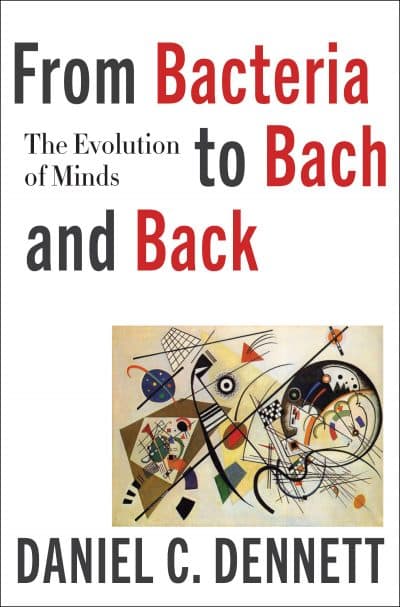Advertisement
Daniel Dennett On How The Mind Works
Resume
Daniel Dennett is one of the most celebrated philosophers of our time, a prolific writer, thinker and speaker, and a giant in the field of cognitive science and philosophy.
He's the author of more than a dozen books, including "Consciousness Explained," which argued that the human brain is a type of computer. His "Darwin's Dangerous Idea" aimed to explain all of human existence not through religion, but through natural selection.
Now, Dennet has a new book: "From Bacteria To Bach And Back: The Evolution Of The Human Mind."
Guest
Daniel Dennett, professor of philosophy and co-director of the Center for Cognitive Studies at Tufts University. His latest book is "From Bacteria To Bach And Back: The Evolution Of Minds." He tweets @danieldennett.
Interview Highlights
On the question posed in his book, "How come there are minds? And how is it possible for minds to ask and answer that question?"
"The reason why the question is so difficult, is because we have to start with the beginning of life on the planet.
What we have to realize is that even the very first living things, things like bacteria, were tremendously complex and it was as if they had minds. They were very competent at staying alive and reproducing. And what Darwin showed and has been confirmed 100 times, 1,000 times over ever since is that a completely natural, material, purposeless, God-less process of natural selection has generated over billions of years, ever increasingly complex minds, brains. And we human beings are the possessors of the most amazing minds of all.
In fact, our minds are unique in many different ways but that doesn't make them supernatural. They are natural parts of the natural world and the hard part is explaining how that can possibly be so."
On consciousness
"Consciousness is certainly the highlight of the human mind but it's not quite so magical and mysterious as a lot of people think. For a lot of people, if you don't mean something almost supernatural by 'consciousness' then you're not talking about 'consciousness.' For 50 years, I've been trying to argue, no. It's just the greatest, gee-whiz marvel of all, but it's not supernatural and it's not immaterial. We can explain it all in terms of what's going on in brains and the things out in the world that those brains are responding to."
On what separates the human brain from the brain of a whale or a bird
"I wouldn't call that consciousness. The cat is sentient. The cat has pain and loves warmth and has pretty good eyesight and very good hearing and very good sense of smell and all of these contribute to the cat's getting through the day quite gracefully. And successfully. You've got that too. And so does every living thing on the planet have that basic set of competencies. Some much more than others.
"What distinguishes your mind from the cat's mind is that the cat's got you might say, a 'bare brain.' Doesn't have any thinking tools. You, however, have been picking up thinking tools since you were born."
On 'thinking tools'
"There's tools like hammers and telescopes and screwdrivers, which are concrete material objects. But then there's tools that are ways of doing things — like long division, or finding the average, or speaking.
"Every word in your vocabulary is a thinking tool. Where do they come from? Who invented them? Nobody. There are tools that have inventors, that have authors. There are words that have been coined. But those are a tiny fraction of the very latest tools.
"How are they possible? How could we have intelligent designers, human beings, that made wonderful things like computers and telescopes and sonnets and symphonies and all the rest? The answer is, there's a second evolutionary process just as natural as Darwinian natural selection of genes and that's natural selection of cultural items. Of thinking tools, really. And they didn't start out being tools, they just were things that could replicate, sort of the way viruses do.
"Birds make nests, spiders weave webs. And we weave webs of words and without them, we'd be pretty helpless. And we acquire our raw materials for this not through our genes. We acquire them through our upbringing and through just being alive and out in the world and looking at things. We pick up thousands of well-designed thinking tools and we install them like apps in our neck-top."
On the question of free will
"The problem with the concept of free will is that there are two quite different notions which are often run together. And really, I have argued, have very little to do with each other.
"One of them is the idea that we are somehow when we make a decision, we're physically cut off from any earlier sources of causation. That's the idea that our free will must be undetermined by the fabric of causation of the past. That's baloney! First of all, if it were true, you couldn't be responsible — it would be like rolling the dice. It would be like a quantum effect roulette wheel. You wouldn't, you couldn't be responsible for anything you do because it wouldn't be the result of your thinking, which in turn was the result of your learning and your discussions with other people and your acculturation, your moral upbringing, all the rest.
"We don't want to be cut off from that. We want that to play a very significant role in turning us into responsible agents. So the idea of indeterministic free will is a several-thousand-year-old mistake.
"But there is a very good notion of free will often called compatibalist which often says free will is compatible with determinism or indeterminism. Physics has nothing to do with it. Free will is a very special suite of competencies that most normal human beings have. No bears or monkeys or donkeys have it. Small children don't have it. People who are deranged or have pathological neural conditions very often don't have it. It's the capacity to think ahead to be moved by reasons, to be capable of self-control and to have, you might say moral imagination. And that is a very real phenomena.
"It has evolved culturally and genetically. It is something that some people don't have it. And sometimes it's not their fault, they've been afflicted in some way. Each of us who does have it has a certain responsibility to keep ourselves in that state."
On his atheism and if there's space for divine design in his explanation of the mind
"Absolutely not. In 'Darwin's Dangerous Idea' I introduce a pair of terms: skyhook and crane. Cranes are not miraculous. Skyhooks of the kind you just hang in the sky, you can lift things with, that's a fantasy, that's magic. It doesn't happen.
"And ever since Darwin, the big question has been, can we get all the way to us, all the way to Shakespeare and Bach and Jane Austen and wonderfulness, can we get all the way there from bacteria? And the natural answer is yes, and it's all done with cranes. No skyhooks. There's no role for any skyhooks. They're not needed."
On if we can go backward from Bach
"We're now living in the age of intelligent design. Lot of intelligent designers out there, artists and scientists and technicians and people that make computers and games and political parties and all the rest. So unquestionably, there are now plenty of intelligent designers, human beings.
"The age of intelligent design is only a few thousand years old ... We're now entering the age of post-intelligent design. Because what we've learned as intelligent designers is that evolution is cleverer than we are at some things.
"We're now turning to making technologies that are fundamentally Darwinian, or they're versions of natural selection. This is things like deep learning, the program that beat the world's Go champion, Alpha Go, these are technologies which do their work the way natural selection does. Mindlessly, without consciousness, without forethought, they grind out better and better and better designs.
"And now, we have in effect black boxes that scientists can use, where they put in the data, they push the button, out comes an answer. They know it's a good answer. They have no idea how it got there. This is black box science. This is returning to our Darwinian roots and giving up on the idea of comprehension."
On if artificial intelligence will evolve like the human brain and surpass us
"Artificial intelligence has already surpassed the human brain in many obvious ways.
"I think although that's possible in principle, and some people make a great deal of this — they imagine a coming age where we have a super intelligence that will simply leave us in the dirt — I don't think it's going to happen. I think it's much much harder and more expensive than people realize. And we're better off using tools now trying to make colleagues. There are plenty of colleagues around.
"We don't need conscious robots, we need unconscious robots that will do slave labor and it won't be a bad thing for them to do it. Because they won't have feelings, they won't have rights, you can take them apart, you can throw them away. And we can control them."
This article was originally published on February 14, 2017.
This segment aired on February 14, 2017.

